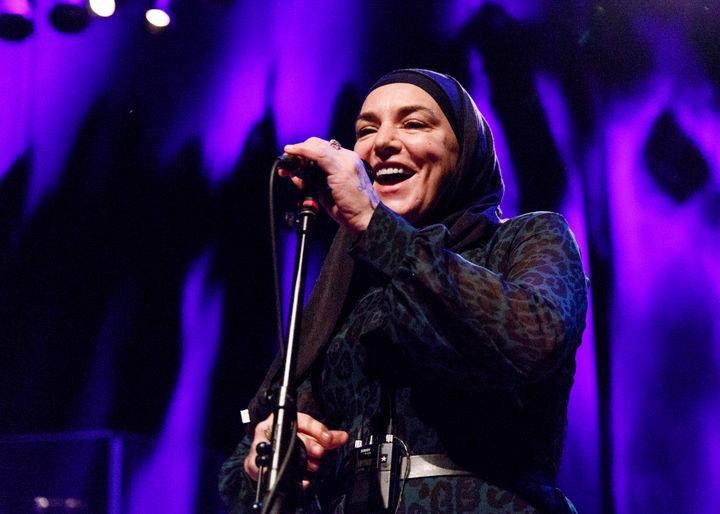
Singer-songwriter Sinéad O’Connor has died at 56, according to her family.
Her death, which was first reported by The Irish Times on Wednesday, follows the death of her 17-year-old son, Shane O’Connor, early last year.
“It is with great sadness that we announce the passing of our beloved Sinéad,” her family said in a statement to the BBC and Irish news outlet RTE. “Her family and friends are devastated and have requested privacy at this very difficult time.”
O’Connor, who was best known for her hit cover version of Prince’s “Nothing Compares 2 U” and her trademark shaved head, was born Sinéad Marie-Bernadette O’Connor on Dec. 8, 1966, in Ireland. She more recently began going by the name Shuhada Sadaqat.
The singer came from a troubled home with an abusive mother, who died in a car crash when O’Connor was just 19.
O’Connor found solace in music and was soon discovered by Irish band In Tua Nua. She helped co-write the band’s hit song “Take My Hand.” Soon after, O’Connor began performing in pubs and signed with Ensign Records in 1985. In 1987, the singer released her debut album, “The Lion and the Cobra,” to critical acclaim.

Andrew Chin via Getty Images
That same year, O’Connor gave birth to her first child with John Reynolds, a son named Jake Reynolds. She married Reynolds in 1988, but the two separated in 1991. Around this time, O’Connor was diagnosed with bipolar disorder at 23 and later told the BBC that she dealt with depression and suicidal thoughts.
The singer followed up her first album with “I Do Not Want What I Haven’t Got” in 1990, featuring the smash hit “Nothing Compares 2 U.” The song, originally written by Prince for the group The Family, earned O’Connor worldwide success and the No. 1 spot on the Billboard Hot 100. Just before filming her iconic video, the singer said she shaved off most of her hair (the start of her trademark look) as a response to male executives within the music industry.
“They wanted me to grow my hair really long and wear miniskirts and all that kind of stuff because they reckoned I’d look much prettier,” O’Connor said in a 2014 interview for Oprah’s “Where Are They Now?” series. “So I went straight around to the barber and shaved the rest of my hair off.”
The singer ended up courting controversy in 1990 when she refused to perform at a New Jersey concert arena if it played “The Star-Spangled Banner” before she took the stage. O’Connor later drew ire when she withdrew from the 1991 Grammy Awards, after garnering four nominations for “I Do Not Want What I Haven’t Got.”
Her third album, 1992’s “Am I Not Your Girl?,” was overshadowed by a “Saturday Night Live” appearance during which O’Connor tore up a photo of Pope John Paul II. The singer later explained that her actions were a statement indicative of the child abuse scandals that plagued the Catholic Church, something she experienced personally as a survivor.
O’Connor’s fourth album, “Universal Mother,” was released in 1994, marred by a prominent custody battle over her young daughter, Roisin Waters. The singer’s career stalled in the late ’90s, though O’Connor released an EP in 1997 and, that same year, appeared in the movie “The Butcher Boy.” Two years later, she became Mother Bernadette Marie, priestess of the Latin Tridentine Church.
In 2000, the Irish singer married Nick Sommerlad (the couple divorced two years later) and she released her fifth album, “Faith and Courage,” with Atlantic. She put out the Irish-influenced “Sean-Nós Nua” in 2002 and briefly announced her retirement from music in 2003.
The singer gave birth to a son, Shane Lunny, with musician Donal Lunny in 2004. One year later, O’Connor returned with 2005’s reggae-heavy album “Throw Down Your Arms,” and the Rastafarian-inspired “Theology” in 2007.
In 2010, O’Connor married her third husband, Steve Cooney, but the two divorced one year later, which is when she married her fourth husband, drug counselor Barry Herridge (they separated 16 days later). O’Connor returned to music after a short break, releasing “How About I Be Me (and You Be You)?” in 2012, followed by “I’m Not Bossy, I’m the Boss” in 2014.
The singer struggled with mental illness in her later years, which she openly spoke about.
“I gave being a ‘regular’ woman a good few tries,” O’Connor said in a 2014 Billboard magazine interview. “There is pressure to be a ‘regular’ woman from the minute you’re born, so I was duty-bound to try. But I’m ‘irregular.’ I don’t try not to be irregular anymore.”
This is a developing story. Please check back for updates.
If you or someone you know needs help, call or text 988 or chat 988lifeline.org for mental health support. Additionally, you can find local mental health and crisis resources at dontcallthepolice.com. Outside of the U.S., please visit the International Association for Suicide Prevention.
